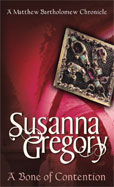
The Third Chronicle of Matthew Bartholomew
Murder, hysteria, superstition …
In 1325, the terrible legacy of the Black Death still hangs over Cambridge. Fears of a future outbreak drive people to seek protection in the power of holy relics, while the University is once more the scene for violent clashes between students and townsfolk. Matthew Bartholomew, Michaelhouse teacher and public physician, has a professional interest in order returning to the streets – his enormous practice of paupers means he does not have time to deal with a lot of injuries resulting from riots and mayhem.
With rumours spreading about the discovery of a skeleton reputed to belong to a local martyr, a skeleton that even the physician confirms as human, a young student’s brutal murder plunges the town into chaos, and Bartholomew must ask himself if the two corpses – and the rioting – are linked to something deeper than local enmities.
When suspicion falls on a respected University Principal and his scholars, Bartholomew’s investigation becomes the source of conflict within the academic community. And there are personal rivalries and painful memories of his own to be exhumed before a chilling conspiracy can emerge, a nightmare of murder and revenge so terrifying that the whole town could be tainted with complicity.
Amazon.co.ukKindle EditionWaterstones
Amazon.comUS Kindle Edition
Extract
Cambridge, October 1327
Breath coming in agonised gasps, d’Ambrey ran even harder. His lungs felt as though they would explode, and his legs burned with the agony of running. He reached an oak tree, and clutched at its thick trunk as he fought to catch his breath. A yell, not too far away, indicated that the soldiers had found his trail, and were chasing him once again. Weariness gave way to panic, and he forced himself to run.
But how long could he continue before he dropped? And where could he go? He pushed questions from his mind, and plunged on into the growing shadows of dusk. His cloak caught on a branch, and, for a few terrifying seconds, he could not free it. But the cloak tore loose, and he continued his mindless running.
He burst out from the line of trees and came on to the High Street, skidding to a halt. At sunset the road was busy with people returning home after a day of trading in the Market Square. People stopped as they saw him. His green cloak with the gold crusader’s cross emblazoned on the back was distinctive, and everyone knew him.
He elbowed his way through them towards the town gate, but saw soldiers there. He could not go back the way he had come, and so the only option for him was to make his way along the raised banks of the King’s Ditch. The King’s Ditch was part fortification and part sewer. It swung in a great arch around the eastern side of the town, a foul, slow-moving strip of water, crammed with the town’s waste and a thick, sucking mud washed from the Fens. There had been heavy rains with the onset of autumn, and the Ditch was a swirling torrent of brown water that lapped dangerously close to its levied banks.
D’Ambrey scrambled up the bank, mud clinging to his hands and knees and spoiling his fine cloak. He saw the soldiers break through the trees on to the road, pushing through the people towards him, and turned to run along the top of the bank away from them. But it was slippery, and running was difficult. He was aware that the soldiers had spotted him, and were moving across the strip of grass below, beginning to overtake him.
It was hopeless. He stopped running, and stood still. His cloak billowed around him in the evening breeze, whipping his copper-coloured hair around his face. The soldiers, grinning now their quarry was run to ground, began to climb up the bank towards him. He knew he was going to die, and drew his short dagger, intending to drive it into his chest, to take his own life before others could. But his gesture was misunderstood.
He heard a singing noise, and something hit him in the neck. He dropped the dagger and raised his hands to his neck. He did not feel pain, but he could not breathe. His fingers grasped at the arrow shaft that was lodged at the base of his throat. The world began to darken, and he felt himself begin to fall backwards. The last thing he knew was the cold waters of the Ditch closing over him as he died.

